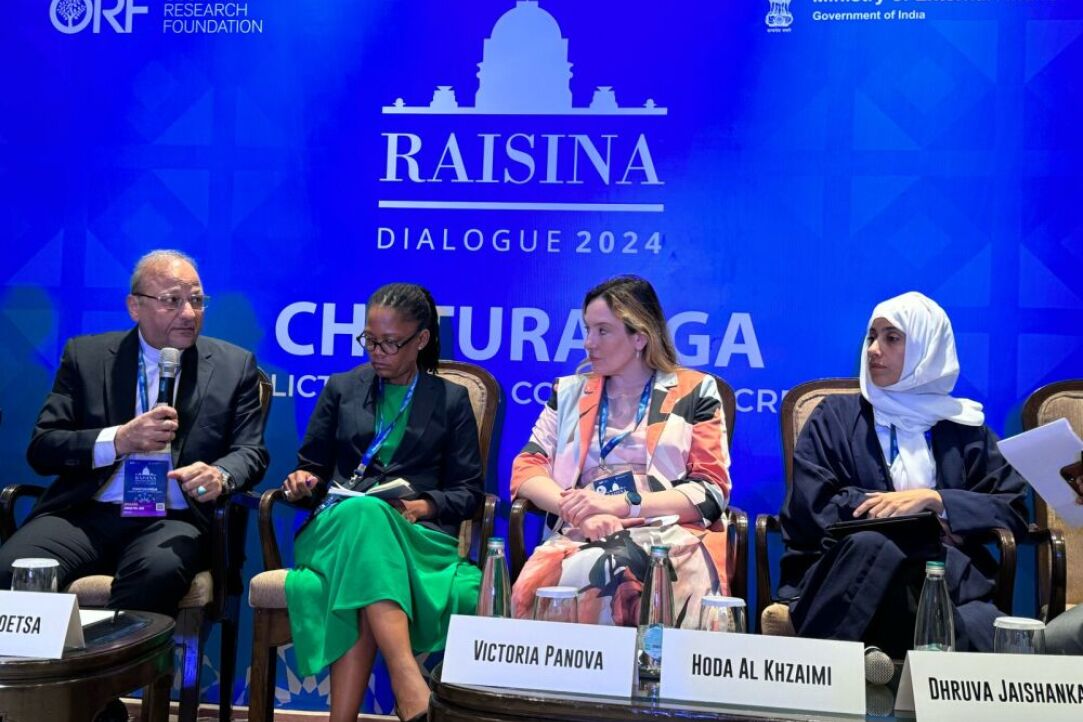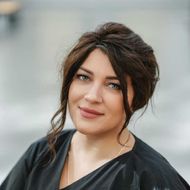HSE Strengthens Cooperation with India and Creates Opportunities for Dialogue between Experts

Following the visit of the HSE University delegation to New Delhi, cooperation agreements with leading Indian universities were finalised. Similarly, a number of expert events, consultations and negotiations on the development of comprehensive strategic cooperation with Bharat took place. The HSE University delegation also participated in the Raisina Dialogue, India’s flagship conference on geopolitics and geoeconomics hosted by the Observer Research Foundation and the Ministry of External Affairs, Government of India.
For more than seven decades, Russia and India have been developing trustworthy relations, in which humanitarian cooperation and friendship play an important role. The roots of these relations go deep into history, allowing us to build stable ties in all directions. HSE University’s cooperation with Indian universities and research organisations continues to develop actively, making Russia attractive for students, scientists, and researchers from India.
In February 2024, a delegation from HSE University, headed by Victoria Panova, HSE University Vice Rector, Head of the BRICS Expert Council–Russia and Sherpa of the Russian Federation in the Women 20, visited New Delhi.

Russia and India are strategic partners and long-standing good friends. For centuries, a delicate connection featuring mutual understanding and respect has been forming between our countries. Our task in many ways is to keep this spark alive. This is a complex and multi-step process that requires complete dedication. If we make friends, we do it genuinely.
During the visit, draft agreements with leading educational organisations in India—Delhi University and Jawaharlal Nehru University—were finalised. The all-university agreement on cooperation and academic exchanges with O.P. Jindal Global University, as well as the International Institute of Peace and Conflict Studies, initiated by the Faculty of World Economy and International Affairs, were handed over to the partners for signing.
The new agreements will open up new opportunities for the parties to launch mirror laboratories, develop student and academic exchange and conduct joint scientific and educational events. This includes short-term educational modules in the most popular areas, such as computer science and artificial intelligence, climate change and sustainable development, green energy, etc. Both countries are particularly interested in Russian studies and translating books by Russian writers into Hindi.

Today, HSE University is focusing on practical cooperation with our partners, creating exclusive conditions for the implementation of joint projects. We are moving beyond the limits, taking our partnership with Indian universities to a fundamentally new level. There are no boundaries, only perspectives.
Another important area of cooperation is creating new expert platforms to discuss the most pressing issues of global development and to generate ideas for building an effective partnership between Russia and India.
HSE University continues to strengthen its status as one of Russia's leading think tanks, creating unique opportunities for building a dialogue between experts from different countries. During the visit to New Delhi, HSE University organised several high-level Russian-Indian expert events, including an expert seminar titled “Russia-India Relations in Unsecure World: The Role of BRICS in Evolving Global Order” jointly with the United Service Institution of India, as well as a Special BRICS Civil Forum Roundtable ‘BRICS Partnership and Strengthening People-to-People Cooperation’ jointly with the Research and Information System for Developing Countries (RIS, India). HSE University also co-organised the expert dialogue ‘India–Russia and the Changing World Order’ together with the Observer Research Foundation (ORF, India) and IMEMO RAS named after E.M. Primakov.
HSE University co-organised a Breakfast discussion “Inclusive Vistas: BRICS, G20 and the Global South”. Victoria Panova spoke about the priorities of the Russian BRICS chairship, as well as approaches to strengthening the role of developing countries in the international arena. Valeria Gorbacheva, Head of the Multilateral Strategic Projects Office, stressed the need for constant interaction.

As part of the work of the BRICS Expert Council–Russia, we hold regular consultations with the expert community of the BRICS countries in order to build cooperation in the framework of the association in the most effective way. We plan to organise consultations with all BRICS countries, and the results of this work will be summarised in the framework of the BRICS Academic Forum.
Raisina Dialogue is one of the world's largest forums on geopolitics and geo–economics. The forum examines the most difficult issues faced by the international community. The theme of 2024 is ‘Chaturanga: Conflict, Contest, Cooperate, Create’. The forum was opened by the Prime Minister of India, Mr. Narendra Modi. The representatives of more than 100 countries, including ministers, former heads of state and government, industrial magnates, technology leaders, scientists, journalists, strategic specialists, experts from leading think tanks, and young leaders took part in the event.
See also:
A Market of a Billion Opportunities: HSE Experts on Doing Business in India
The rapid growth of India’s economy and its predominantly young population present unprecedented opportunities for Russian businesses. However, success in this vast market requires a deep understanding of its internal diversity, as well as cultural and legal nuances. These issues were the focus of the business session ‘India: A Market of a Billion Chances. How to Succeed,’ organised by the expert club of the Eastern Perspective programme at the HSE Faculty of World Economy and International Affairs.
Roundtable on Russia–China Cooperation in Antimonopoly Policy Held at HSE University
HSE University hosted a roundtable titled ‘New Challenges for Antitrust Regulation: The Chinese Perspective.’ The event was organised by the International BRICS Competition Law and Policy Centre (BRICS Centre). Special guests included Chinese colleagues from the Competition Policy and Assessment Centre (CPAC) of the State Administration for Market Regulation of the People’s Republic of China (SAMR). Last year, the BRICS Centre and CPAC SAMR signed an agreement on strategic cooperation.
‘The Trip Exceeded All Our Expectations’: HSE Students Take Part in BRICS Youth Innovation Summit 2025
The BRICS Youth Innovation Summit 2025 was held in Cape Town on April 10–11, 2025. The event was attended by political and business leaders from Brazil, Russia, India, China, and South Africa. The summit focused on the theme ‘Innovating the Future: Technology for Sustainability and Social Good,’ under which the participants presented their projects. Students of the Faculty of Economic Sciences have shared their experiences of the trip to South Africa, their presentations at the BRICS summit, penguin encounters, and more!
Spring Colours and Indian Culture: Holi Festival Held on Pokrovka
The Holi Festival, a celebration of spring, sunlight and Indian culture, was held at the atrium of the HSE University building on Pokrovsky Bulvar. Students and teachers immersed themselves in the atmosphere of one of the most vibrant Indian holidays, trying on traditional saris, participating in an quiz, and enjoying live performances.
‘Opportunities Always Exist; You Just Need to Find Them’
Kartik Joshi, from India, is pursuing a master's degree at HSE University, specialising in Data Science. In his interview, he talks about his life and studies in Moscow and invites HSE students and staff to participate in the Holi festival on March 21.
HSE’s Education Observatory Establishes Research Network Across All BRICS Countries
The International Education Observatory initiative, launched by HSE University to focus on expert evaluation, analytics, and joint scientific research, has successfully completed the formation of a research network across all BRICS nations. South Africa was the final link, with the University of Pretoria and the University of the Witwatersrand joining experts from Russia, China, India, and Brazil.
‘One Must Possess Knowledge, Skills, and Competencies to Build a Successful Business in Eastern Markets’
HSE University’s Eastern Perspective expert club has held its first event—a business session dedicated to launching and developing successful businesses in India. The club was created by HSE experts to discuss tools, trends, and insights for cooperation between Russia and countries in Southeast Asia, the Middle and Near East, and North Africa. The event featured experts with years of successful experience working in the Indian market on behalf of major global corporations.
‘Land of a Billion Chances’
On January 23, HSE University's Eastern Perspective Expert Club will hold its first event—a business session dedicated to setting up and developing a successful business in India. Leading global experts have described the country as ‘a market of a billion chances.’ Speakers will present five key steps in market research, the three most effective strategies, and the geography of the most promising industries and opportunities.
Building Strong Ties: HSE Expands Horizons of Educational Collaboration with India
Representatives from the HSE Institute of Education have visited leading Indian universities, including the University of Delhi, Jawaharlal Nehru University, and O.P. Jindal Global University, as well as several research centres. HSE staff gave guest lectures on the Russian education system, highlighting its features and opportunities for international students. The visit aimed to strengthen academic collaboration between the two countries.
The Future Through the Eyes of Young Scientists
A delegation of teachers and students from the HSE Campus in Nizhny Novgorod participated in the IV Young Scientists Congress and the IX BRICS Young Scientists Forum held in Sochi. These two key events of the Russian Decade of Science and Technology brought together representatives of the academic and university community, state corporations, private businesses, and public organisations to envision the future of Russian science through the lens of the younger generation.


